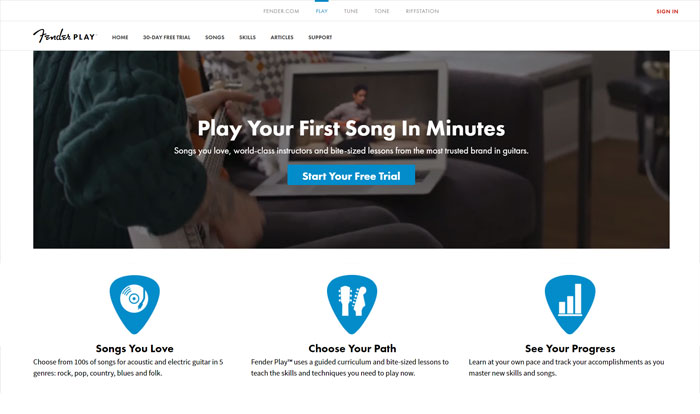Fender Digital – July 2017
Fender address “drop out rate” with Fender Digital division
Can Fenders online education expand the guitar market?
Fender Digital is betting that with a team of 85 producing content designed to inspire and assist guitarists, it can keep them playing longer.
Fender’s market research claims 90% of first-time guitarists give up within a few months, putting their guitar in the closet.
Ethan Kaplan, General Manager Fender Digital has said “Ninety percent of people who pick up the guitar will drop out after one year, and we see Fender Play as a solution to that challenge. Our intuitive platform, whether used on its own or as a practice supplement to in-person lessons, allows first time players and beginners to get started.”
Andy Mooney, Fender CEO says that reducing that “drop out rate” by just 10% could double the sale of new guitars.
In addition to stimulating demand for guitars, he says the Fender Digital division can be a profitable business in its own right. He estimates that the money spent on guitar lessons and educational materials is about four times larger than the sums spent on new guitars.
Given the increased affinity for accessing information online, he sees a natural market or a digital offering, and a potentially meaningful revenue stream.
Can a high-quality online education program expand the market for guitars by inspiring guitarists of all levels to spend more time with their instrument?
Is there a profit to be made in online learning?
Fender Digital, the division of Fender Musical instruments, is attempting answer those questions, with a comprehensive suite of online educational materials launched in July 2017.
Fender Digital is an ambitious undertaking, backed by a significant investment. A team of 85 headed by Ethan Kaplan has been hard at work in Los Angeles for nearly two years, developing a guitar curriculum, creating online lessons and educational apps, and integrating them into the appealing, user-friendly “Fender Play” website. All with the goal of transforming the educational process and stimulating the market.
Accessible from laptop or mobile devices, Fender’s digital content is organized into two broad categories: Fender Play, which includes a constantly expanding library of online lessons, and Fender Tone, which serves as a gear reference, providing a wealth of information on amp and effects set ups and how to recreate specific artists’ sounds. Fender tone also includes useful tools like a free tuner.
Both the Tone and Play content are designed “so that they aren’t intimidating for the beginner, but aren’t so limited that an expert won’t use them,” says Kaplan. Full access will be offered for a $19.95 monthly fee. Ethen Kaplan is quick to point out that the Fender digital offerings have little in common with them multitude of free youtube instructional videos. “We are not using the ‘goPro and player on a couch’ approach,” he says.
Instead, a production team drawn from the ranks of local television and movie studios, using five cameras and high-resolution audio gear, has turned out educational videos with cinematic production values. From the performers to the script to the lighting, every facet has been calibrated to “address all the flaws in online learning,” adds Ethan Kaplan. In other words, Ethan is claiming Fender digitals approach to online guitar video learning is at a higher standard than average.
Multiple cameras allow for an unobstructed view of finger positions, and crystalline audio quality lets users really hear different techniques and tone settings. However, according to Ethan Kaplan, what truly sets the lessons apart is a carefully crafted song-based curriculum designed to get beginners engaged quickly. “Rather than scales or strumming techniques, we start you into your first song right away,” he says. “Within the first hour, we want the beginner to get that endorphin hit that comes when you play something that sounds like one of your favourite songs.”
The lesson site is organised by five basic genres: Rock, Pop, Folk, Country, and Blues. Within each genre, are discrete lessons on songs ranging from classics like Smoke on the Water to contemporary songs from bands like the national and Band of horses. An accompanying glossary Video section illustrates guitar terminology like “rosewood” or “humbucker,” and playing techniques like palm muting or arpeggios. The two sections allow a student to focus on a song without interruption, consulting the glossary when they encounter something unfamiliar or need a more in-depth explanation.
The Fender online offering also includes the recently acquired Riffstation, a unique digital application that allows users to import audio, learn basic guitar chords for any song, master riffs, and create custom tracks for jam sessions. The program is available in two versions. The free mobile app provides chords and play along functions for a large catalogue of popular songs. The desktop “Pro” version, available online for $34.99, has the capability of transforming any MP3 audio track into a powerful educational device. Within about eight seconds, the program can process an MP3 file and isolate the basic chords, thus helping beginners master their favourite songs. Vocal and solo tracks can also be eliminated, creating an ideal play-along backup. In addition, tempos can be altered without shifting pitch.
Kaplan says that Riffstation currently exists as an “island” within the Fender digital offerings, but will be integrated more fully into the system in the near future. Detailing Fender’s online offering is challenging because the content is being added almost daily. Plans are in the works to add worship and gospel genres, as well as lessons for bass and ukulele. In addition, the glossary section is updated every time Kaplan or one of his team members come across some guitar jargon that might need to be explained to a beginner. Whether targeted to a beginner, intermediate, or advanced players, each lesson has been scripted under the guidance of online learning specialists and accredited music educators.
“Online teaching hasn’t been done well or right,” says Kaplan. “We’ve analysed every aspect to correct what’s wrong and make something that really works.” He bases this boast on extensive field testing with absolute beginners. Working with a Fender online lesson, in most cases, they could play a passable rendition of one of their favourite songs in about 25 minutes.
There are guitar teachers in every market, not to mention enough existing instructional materials to fill several libraries. How then does the Fender online program make a material impact on the number of guitar players? Kaplan explains, “What we’ve found in our consumer research is that there are a lot of people who have played for a long time and still consider themselves beginners. Like a gym membership, they start in January and then quit by March. Then they lose their calluses and go through the pain of starting all over again. We think we can help keep these people going by giving them a realistic sense of accomplishment—learning to play their favourite songs, at the time of their choosing, like in a dorm room at 2:00 a.m.”
Unlike other online programs, Fender’s has the support of a wide range of notable artists who are excited about the prospect of their music being used to help launch a new generation of players. Kaplan says, “Every top act we’ve talked to, whether they’re 22 or 50, has vivid memories of being a beginner, putting a needle on record to decipher a riff, and struggling to master a song. They all see the potential of what we’re doing here, and are excited to be involved.” Fender’s management ranks are filled with guitar “geeks” steeped in the minutiae of pick-up windings, fret dimensions, and wood.
Developing an online educational program required a very different skillset, like the one Kaplan brings to the enterprise. As a teenager in Orange County, California, his free time was divided between playing in local coffee houses and writing computer code. While he was still in high school, his computer skills sufficiently impressed the management of the Orange County Register that they tapped him to develop an online version of the newspaper. Surreptitiously, he used the newspaper’s server to develop a website for his favorite band, R.E.M. the site quickly became a magnet for fans, brought Kaplan to the attention of R.E.M. and its management, and later led to a job offer from the Warner Music group. R.E.M.’s manager described him as a “geek who knows music.” At Warner, Kaplan developed a digital product division that presided over 600 artist websites, fan clubs, and a direct-to-consumer sales channel. He left Warner to head product, technology, and engineering at live nation Entertainment’s lab division, where he built an online platform from the ground up. “We offered more than just a ticket buying experience,” he says.
“We developed content that enhanced the fans’ concert-going experience before, during, and after the show.” Most recently, he served as senior vice president and general manager of Music at Gracenote, which provides video and music content and technology to top streaming services including iTunes.
Fender Digital represents the first time an instrument manufacturer has made a significant investment in online education. That doesn’t mean that new site is without competition: thousands of free online videos are also vying for the finite attention of players. Kaplan is confident that the linear curriculum, high production value, and absence of ads and filler, will make the Fender content a potent draw. “You can learn to do just about anything piecing together YouTube videos,” he concedes. “But, it’s hard to figure out where to start, what’s good, and what’s bad. We figure it out for you, giving you place to start and a curriculum that will take you where you want to go. It’s like you could buy parts and assemble your own Stratocaster, but it’s easier and more effective to buy one from us.”
A RETAIL PROFIT OPPORTUNITY
OVER HALF OF ALL FENDER dealers in the U.S. offer some type of on-site lesson program. Fender CEO Andy Mooney says Fender Digital offerings represent a complement, not competition to these important efforts. To that end, Fender’s online learning program includes significant profit opportunities for retailers and instructors. Retailers will have the opportunity to bundle discounted Fender Play subscriptions with the sale of any Fender guitar. In addition to adding value to the instrument, Mooney says that the subscription sales also offer a “good margin” with no inventory commitment. The mechanics of the sale will be seamlessly managed by Fender Digital. In 2018, Fender Play will add an “Instructors Edition,” that Mooney describes as “closing the circle.” In-store instructors will be able to tailor elements of the Fender curriculum for their students and make use of tracking software to monitor their progress. Instructors who sign up for the program will have their bios and contact information listed on the Fender Play website. Mooney adds, “we want to share the financial success of Fender Play with our retail partners, and create a seamless learning experience for students either online or in person. We all share the same goal, reducing the abandonment rate to grow the entire industry.”
See Fender’s new online approach here…www.fender.com
See Fender’s news release…fender.com/newsroom



